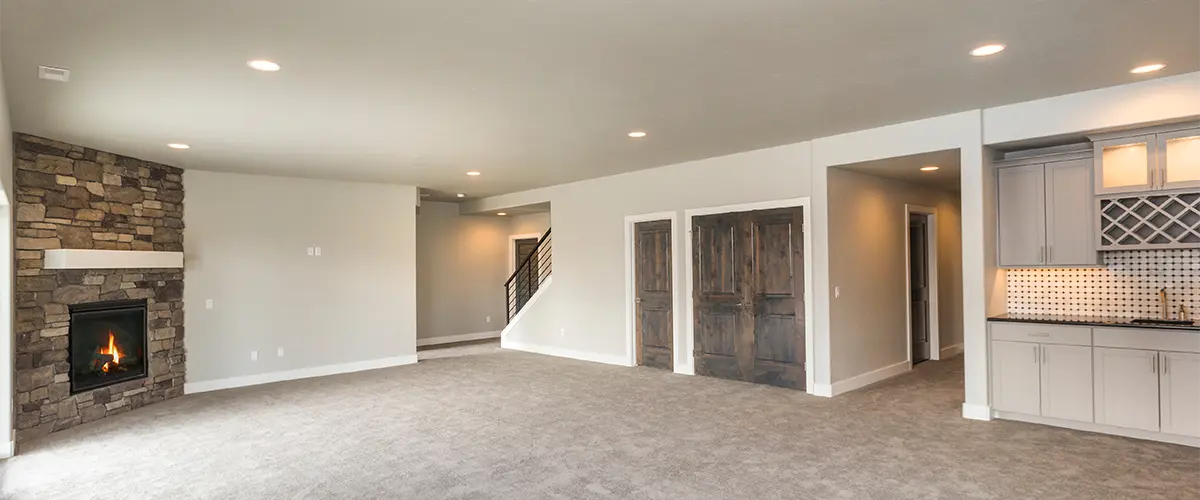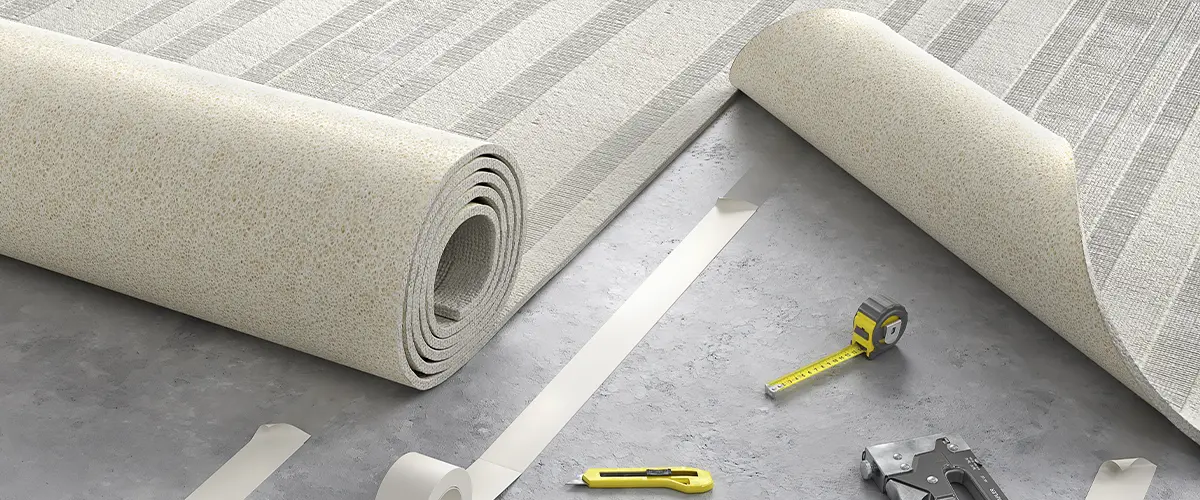Pros And Cons Of Carpet In Basement
Deciding on the right flooring for your basement in can be tricky. One popular choice is carpet – known for its comfort and warmth.
This article will guide you through the benefits and drawbacks of installing carpet in your basement.
Read on to find out if it’s the right fit for your home.

Pros of Carpet in Basements
- Sound Reduction
Basement carpets greatly reduce noise, making your space quieter. Thick carpet pad under the carpet absorbs sound, turning your basement into a peaceful area. This is especially important in homes with high traffic areas or small children running around.
Installing carpet in basements also means less echo from voices and music bouncing off hard surfaces like concrete floors. You’ll notice a significant difference in how soft and quiet the room feels compared to tile or hardwood floors.
- Warmer Flooring Option
Moving from the quiet comfort sound reduction brings, having carpet in your basement also means a warmer flooring option. Carpets trap heat, making your feet feel cozy even on cold days.
This is especially true for colder climates where winters can get chilly. Carpet acts like insulation on your basement floor, keeping warm air in and cold out.
Choosing to install carpet transforms a typically damp and cold basement into a welcoming space. It’s different from concrete flooring or tiles that often feel icy underfoot. Warmth encourages family and friends to use the basement more, turning it into a favorite spot during winter months.
Plus, saving on heating costs is always a bonus as carpets help maintain steady temperatures without overworking your home’s heating system.
- Can Reduce Allergens
Carpet in basements can help manage allergens like dust mites and pet dander. Special carpet tiles designed with synthetic materials are often more resistant to these allergens. They trap particles within their fibers, preventing them from floating around in the air.
Regular vacuuming removes these trapped allergens, making the basement a safer environment for those with allergies.
Choosing low pile carpets also contributes to a healthier basement atmosphere. These carpets have shorter fibers that are easier to clean and less likely to harbor allergens. Moreover, some carpets come treated with stain-resistant chemicals, further reducing the risk of mold and mildew growth.
This makes them an excellent choice for homeowners concerned about indoor air quality.
Cons of Carpet in Basements
- Vulnerable to Moisture and Water Damage
Basement carpets are at risk of moisture and water damage, which can lead to mold and mildew. This makes regular monitoring essential for preventing long-term issues with damp basement floors.
Installing a waterproof subfloor or using moisture-resistant carpeting materials can help mitigate this risk of moisture and even flooding.
Consider consulting with a professional about the best flooring options for wet basements to ensure protection against potential water leaks or flooding. Regular maintenance and investing in a dehumidifier may also be necessary to control humidity levels and prevent moisture-related problems with basement flooring.
- Difficult to Clean
Having to deal with moisture and water damage can make cleaning basement carpets challenging. Over time, dirt and stains that accumulate can be harder to remove due to the material’s long fibers and the potential for mold growth in damp conditions.
Regular vacuuming and professional deep cleaning are essential for maintaining carpet cleanliness, but it may still pose a challenge in basement environments with higher humidity levels.
Considerations such as using stain-resistant materials or opting for alternative flooring options like luxury vinyl plank or engineered wood could help alleviate the difficulties of keeping basement carpet clean, especially in colder areas where floor moisture and wet conditions can exacerbate these challenges.
If you’re looking for a moisture-resistant alternative, epoxy flooring for example offer excellent durability and low maintenance basement flooring alternative.

Top Carpet Manufacturers for Basements
- Shaw Floors: Offers a wide variety of moisture-resistant carpets, ideal for basement conditions.
- Mohawk Industries: Known for innovative fibers that resist staining and fading, perfect for busy basements.
- Stainmaster: Specializes in carpets that fend off stains and spills, making maintenance a breeze.
- Interface: Provides modular carpet tile options with robust backing systems, tailored for damp environments.
- Milliken: Combines technology and style, offering carpets that are both durable and aesthetically pleasing.
Considerations for Choosing Carpet in Basement
Consider the moisture levels in your basement before choosing carpet. Ensure proper sealing and insulation to avoid potential water damage. Opt for moisture-resistant materials such as nylon or polyester, which are durable and less susceptible to mold and mildew compared to natural fibers like wool.
Evaluate the traffic in the basement when selecting carpet. Stairs may require a more durable and stain-resistant option than an area with minimal footfall. Utilize carpet squares for easier maintenance in high-traffic areas, making replacement of damaged sections simpler without the need to reinstall the entire floor covering.
Examine installation methods carefully when choosing basement carpet. For basements prone to flooding, consider materials that can be installed directly on concrete without adhesive, allowing for easier removal if necessary due to water damage or excessive moisture.
Choose low-pile carpets for easy cleaning and maintenance. In a basement environment where dust tends to settle, opt for styles that trap less dirt and are easier to vacuum regularly, reducing allergen accumulation within the space while maintaining a cozy flooring option.
FAQs
Why Choose Us for Your Basement Carpeting Needs
Our team has been installing basement carpets for years, combining professionalism with industry-leading expertise. Choosing the best yields unparalleled results and savings in the long run. Ready for exceptional service? Contact us at (402) 661-0910 to start your project with our experts.
